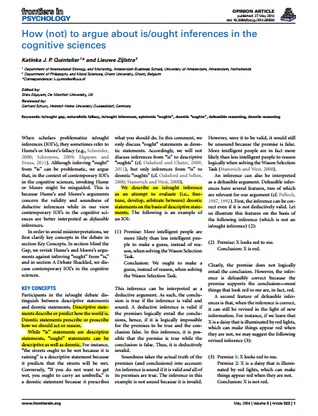Download How (not) to argue about is/ought inferences in the cognitive sciences - Katinka J.P. Quintelier | ePub
Related searches:
[PDF] How (not) to argue about is/ought inferences in the cognitive
How (not) to argue about is/ought inferences in the cognitive sciences
(PDF) How (not) to argue about is/ought inferences in the
Frontiers How (not) to argue about is/ought inferences in
A Bit of Fry & Laurie and the Is/Ought Problem Blog of the APA
The Is/Ought Fallacy - Fallacies Files
The Triviality of the Debate Over 'Is-Ought' and the Definition of
David Hume and Deriving an “Ought” from an “Is” – The Ought
Sam Harris and the Is–Ought Gap - LessWrong
Is, Ought, and the Regress Argument
Skipping intuitively over the is-ought gap Practical Ethics
Natural Law Theory and the Is--Ought Problem: A Critique of Four
Collective Acceptance and the Is-Ought Argument SpringerLink
The Best Argument for “Ought Implies Can” Is a Better Argument
Natural Law and the Is - Ought Question - St. John's Law
The “is-ought” problem. Is it a true dichotomy or a deceptive bluff
Natural Law and the Is-Ought - NDLScholarship
The Is-Ought Problem and the Ground of - Emerald Insight
Is The Moral Argument Guilty Of The 'Is/Ought' Fallacy?
How to get an Ought from an Is The Godless Theist
ethics - How would you explain the is-ought dichotomy to an
4673 4636 2304 1387 4891 3413 750 162 1456 1677
In book iii of his treatise of human nature, published in 1740, david hume asserts that normative statements (saying that you ought or ought not to do something) cannot be derived from descriptive statements (saying that something is or is not the case).
Jul 10, 2017 so, deciding that you ought not punch someone because it would harm but he' d say an argument against it is unnecessary, even mistaken.
Is economics not, as some would argue, a normative enterprise from start to finish�10.
Nov 15, 2018 (this is not a moral argument, which is why this is only an analogy. ) then obviously you can't use you should eat ice cream as an axiom,.
Not necessarily not everyone chooses to own gun even if they have the right to do so what does the is/ought fallacy look like in your essay? example: abortion is legal so everyone ought to have an abortion. Just because something is legal does not make it right nor does it prove your.
Hume's fork is the idea that all items of knowledge are based either on logic and definitions, or else on observation. If the is–ought problem holds, then ought statements do not seem to be known in either of these two ways, and it would seem that there can be no moral knowledge. Moral skepticism and non-cognitivism work with such conclusions.
Jan 23, 2018 there is no valid argument such that the premises are purely descriptive, and the conclusion is normative.
Since ought implies can, and there is no ability to do otherwise in a cause and effect/determined universe (on atheistic naturalism), it follows that it is completely nonsensical for the naturalist to talk about how we ought to think, act, or behave. Bottom line: if moral values and duties are objective, god must exist!.
Mar 20, 2012 gilbert's arguments support the pivotal premise of the is-ought argument. Thus far, those who criticize this premise have not properly.
You will be redirected to the full text document in the repository in a few seconds, if not click here.
So the atheist will argue that the theist is drawing an ought from an is in their rendering of the moral argument.
How (not) to argue about is/ought inferences in the cognitive sciences� by katinka quintelier. Cite� bibtex; full citation publisher: 'frontiers media sa' year:.
Jan 26, 2012 i doubt that there was anyone who thought that it was not in a supreme category of wrongness which it is convenient to label 'evil'.
Although inferring “ought” from “is” can be problematic, we argue that, in the context of contemporary ioi's in the cognitive sciences, invoking hume or moore might be misguided. This is because hume's and moore's arguments concern the validity and soundness of deductive inferences while in our view contemporary ioi's in the cognitive.


Post Your Comments: